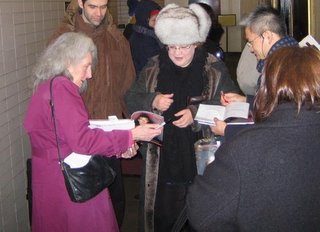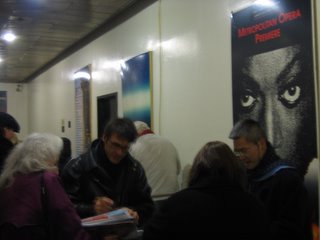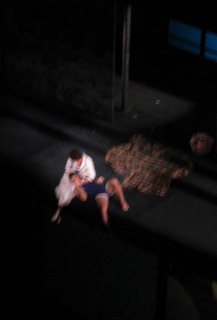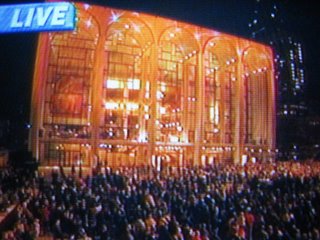Sieglinde's Last 2005 Gasp

Berg WOZZECK, Met 27.12.2005; Levine; Dalayman, Forbis, Clark, Held, Fink.
1. Truce. As someone who actually attended the Wozzeck in question, and who absolutely couldn't find any more words to communicate her utter devotion to James Levine (architect of good things and the Met's heavenly aurora), Sieglinde actually planned to bear witness to Anthony Tommasini's review in the New York Times. May be hard to believe, but she meant to write glorious things about this Wozzeck and that review sooner, but (a) fatty dinners and family happen during the yule season, and (b) the cadaver of the whole bloggers v. print critics fracas is still warm. Sieglinde most certainly doesn't want to appear like a Judas or a Mary Magdalene in this whole thing (she's still, by and large, with you on this one, blogger sweets); however: the family members that I took to see the Tuesday evening Wozzeck had three earfuls (each) of instapraise for Levine, Berg, Wozzeck, and for all the singers (especially goddess Katarina Dalayman, who sang Marie) during our (late)dinner walk through the Upper West Side; and one of them remarked yesterday that Tommasini's rave sounded essentially identical (in tone, if not in detail) to my spattered drool. (I so wish I took the first opportunity to comment; now, anything further I say on this issue shall be viewed in that unfortunate clouded prism. So ... uhm ... that's it.)
2. Vision. I don't know much about operatic works that have arrived after Strauss and Puccini, but I think I know how any opera should be. There are nodes in my nostrils, hairs in my ear, buds in my tongue that have to be activated; "what the f*" must be muttered a few times; during key moments, I should be induced to stop my breathing; the calcified heart, upon exit to the plaza, must feel healed somehow. Levine's Wozzeck did all that. Lately, Levine's been doing that. All the time we put in, the cost of CDs and tickets, the pity of friends, the scorn of next-door neighbors and the wrath of ushers, the violent breakups (with nonmusical hot boys), grief for lost love and lost recordings: once in a silverblue moon, all that is remunerated by one high note brighter than the sun, one low chest note larger than the sun, or in this case, one frightening mass of music (and its exact performance) more essential to life than the sun. The Berg is theoretically formidable, but metaphysically it's among the most immediate works on the Met stage this season; or more accurately, Levine makes it somehow possible. Tommasini surrounds the issue attentively; yes, he put the right nut on the right bolt in characterizing Levine's astonishing work as speaking thus: " 'Let me worry about all that; you just sit back and let yourself respond to dramatic sweep and musical power of this tragic story.' " But of course, it's never possible to just sit back, when we are presented with a vision of heaven.
3. Altar. Katarina Dalayman ... oh Katarina Dalayman, you are a blast of powdered thrill. Your sound is both firetruck and mother, thunder and flowerbed. Vulnerable but strong-willed, feminine yet steel, steel yet pathetic. Your every leap to the upper register is an automatic orgasm. The geyser of your top notes spreads an uncommon heat. It is an arsenal of terrifying shreiks slicing a Rysanekian outline through the dark Met air. You are dramatically present, your body cages a raw passion. Why aren't you singing every other dramatic German soprano role at the Met? (Oh yeah, there's the matter of Deborah Voigt.) Please move to New York.
4. Hello? [To anyone on the fence about or decidedly not seeing this Wozzeck: may as well dump that I-love-dat-girl-Sieglinde Fan Club membership renewal notice in the trash. You're no longer welcome here. Decades from now, when Sieglinde, on her 80th birthday, compiles her all time favorites, a Wozzeck or one of their friends will likely make the list, and the one this season'll probably head that group of renegades. If I weren't going away, I'd be there three more times, and be totally shredding programs for some good ol' fashioned curtain call confetti shower. Swear.]
5. Clearing. I saw Brokeback Mountain the same day as the Wozzeck. Aspects of everyone's lives are on every film, if one looks close enough. However, one crucial storyline of my life, the intensely solitary queer longing, has remained a secret in popular film; that is, till Brokeback. Well, I cried and cried my eyes out for Wyoming cowboys, I couldn't have imagined it; I couldn't have imagined it otherwise either: they really had to be cowboys. (Sieglinde melts even at the sight of the word "cowboy." Discuss.) Or major-league baseball players. (Either way, played by Jake and Heath.) What got me about Brokeback, however, is what gets me all the time: years hence, the Marschallin looks away, but all she sees is a love she once knew, a love she knows she'll never again know, and if there's a mirror in the scene, crow's feet, eye bags, and some sad sagging cheekskin. We'll thank Ghena for Botox later; in the meantime, let me see that film again.
6. Taxi! Sieglinde has so much more to say (about Wozzeck and Brokeback, as well as the last Futral/Vargas Lucia this Met season, which she saw and loved), but as always, it's after midnight and those dancing shoes will turn into pumpkin any second now. OK, so ... Happy New Year to everyone, Netrebko lovers and haters alike. (Sieglinde's off to the Old World for some R&R and moblogging. Whee!)



























